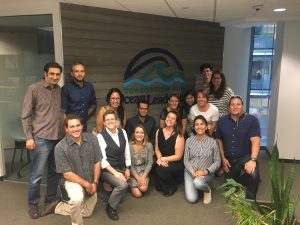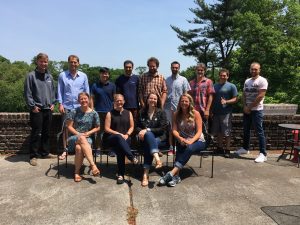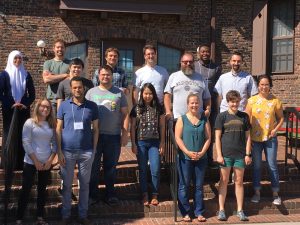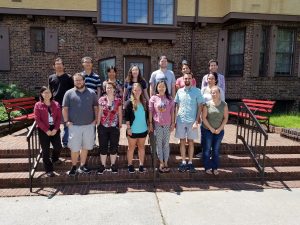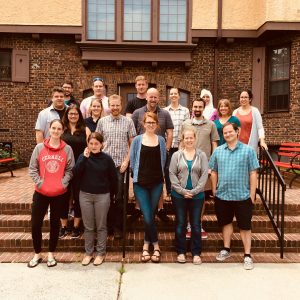OOI Early Career Workshops create opportunities for scientists to engage with the OOI and collaborate with peers
By Liana Vaccari, OOI Community Engagement Program Specialist
The Ocean Observatories Initiative (OOI) allows researchers new opportunities to investigate cutting-edge questions facing ocean science today on a scale beyond what can be arranged by any individual scientist. As the initiative continues its operations and maintenance phase, it is crucial that investigators, particularly early career ones, are trained on the availability of data from the OOI system for their use and expansion of existing resources.
To this end, in the spring and summer of 2018, the OOI hosted five workshops for early-career scientists – graduate students, post-doctoral scholars, pre-tenure faculty, etc – interested in learning more about the infrastructure and how to use data from the program in their work. These early career scientists came from across the US, New England, to Washington State, to Hawaii, including central states such as Illinois, as well as Canada and Europe. The week-long data-oriented workshops were designed to inspire participants to pursue projects with OOI available resources.
Meredith Burke, a doctoral student at Dalhousie University, said of her experience, “The OOI workshop allowed me the opportunity to hone my programming skills by working through real datasets. I feel that I am now qualified to guide others through the OOI data portal and show off the incredible and vast amounts of information stored there. It was an amazing opportunity!”
The first four workshops focused on specific oceanographic disciplines (physics, biology, geology, and chemistry). Participants at each workshop were asked to use their subject matter knowledge to analyze data from a selection of OOI instruments to create a Data Validation Report. More information about each of these workshops, including handouts and Python notebooks, and participant Data Validation Reports can be found here.
“The data workshop made me more comfortable with navigating OOI’s cyber infrastructure,” says Molly James, a doctoral student at the University of Connecticut. “I learned some basic python and ways to access data more efficiently. There was definitely a learning curve, but once I got a handle on it, I could generate plots and begin to explore science questions.”
The fifth workshop focused on cross-disciplinary research collaboration. Participants were current users of OOI data and attendees from the discipline-based workshops. In addition to fostering these collaborations, the workshop provided training in science communication and proposal writing. The communications training was centered around understanding how to communicate research across disciplines as well as to audiences other than scientific peers. This was followed by a visit to the National Science Foundation (NSF) to discuss their work and the basics of proposal development with program managers. The visit provided an opportunity for participants to practice the science communications techniques and form important connections for their careers.
At the workshop, participants had the opportunity to worked in cross-disciplinary sub-groups to develop ideas for scientific proposals and big picture projects. Yuanyuan Xu, a doctoral student at the University of Delaware, was part of one team discussing means of enabling and encouraging citizen science as a supplement to OOI data. “It was very exciting to interact with people from various disciplines and to be inspired!” says Xu. “I enjoyed the group discussions and found it a great way to combine our thinking of the OOI from different perspectives and to form a big idea!”
For many subgroups, when they first came together it seemed that their focuses were too diverse for productive cross-talk, but they soon found they had commonalities in their skills and questions they wanted answered. From this, they developed insightful projects with both pragmatic and aspirational next steps. “The workshop created a comfortable environment that enabled interdisciplinary science conversations to progress,” says Justin Stopa, an assistant professor at the University of Hawaii. “Conversations I had with other participants and soon-to-be new colleagues left an imprint in my mind that continues to spark my scientific curiosity.”
Connecting scientists to data and to each other gives them the opportunity to shape the field. Through these workshops, the OOI has given these early career scientists some tools to do just that. OOI data will allow them to prove their merit without the need for large amounts of funding up front, enabling them, individually and with their peers, to propose new projects to the NSF and other agencies and move ocean observing forward.
As Matthew J. Kupchik, a post-doctoral researcher at Louisiana State University, said of these workshops, “The combination of data access and manipulation at the biology OOI workshop hosted by NSF and COL, with the interdisciplinary workshop on program development, provided me an opportunity to become immersed with the OOI system and architecture and collaborate with other promising early career scientists to think about integrative oceanographic science now, five, ten, and twenty years in the future.”

